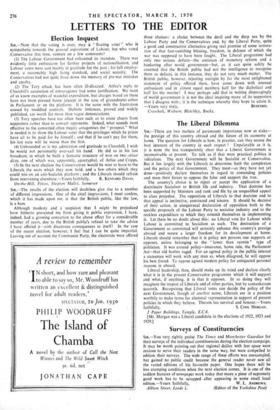The Liberal Dilemma
SIR,—There are two matters of paramount importance now at stake— the prestige of this country abroad and the future of its economy at home. The question for Liberals is how, in practice, can they secure the best interests of the country in each respect ? Unpalatable as it is, it is none the less transparently clear that a Liberal Government is inconceivable at present. To talk as if that were practical politics is ridiculous. The next Government will be Socialist or Conservative. But it lies largely with the Liberals to determine both the complexion and the policy of that Government. They must—as they have not yet done—positively declare themselves in regard to contending policies and mass their forces to oppose the false and support the true.
The country's choice is to reject or accept the application of a doctrinaire Socialism to British life and- industry. That doctrine has been supported by Ministers and rank and file by an unqualified appeal to class prejudice. The opposition of Liberals to that doctrine and to that appeal is instinctive, convinced and sincere. It should be decisive of their action, in unequivocal declaration of opposition both to the specific proposals of the Labour Party to socialise industry and to the reckless expenditure to Which they commit themselves in implementing it. Let there be no doubt about this: no Liberal vote for Labour while Labour is committed to ' Socialism as such. The destruction of a Government so committed will certainly enhance this country's prestige abroad and secure a larger freedom for its development at home. Liberals should remember that it is policy not persons one supports or opposes, unless belonging to the "lower than vermin" type of politician. It was around policy—insurance, home rule, the Parliament Act—that old battles raged. For an agreed policy in the public interest a statesman will work with any man as, when ditagreed, he will oppose his best friend. To oppose agreed modern policy for antiquated personal reasons is absurd.
Liberal leadership, then, should make up its mind and declare clearly what it is in the present Conservative programme which it will support and what, if anything, it is that it opposes. In so doing they will recapture the respect of Liberals and of other parties, lost by cantankerous quarrels. Recognising that Liberal votes can decide the policy of the next Government, though of another name, Liberals are in a position worthily to make terms for electoral representation in support of present policies in which they believe. Therein lies survival and honour.—Yours
faithfully, S. COPE MORGAN. 2 Paper Buildings, Temple, E.C.4.
[Mr. Morgan was a Liberal candidate in the elections of 1922, 1923 and 1929.]


































 Previous page
Previous page